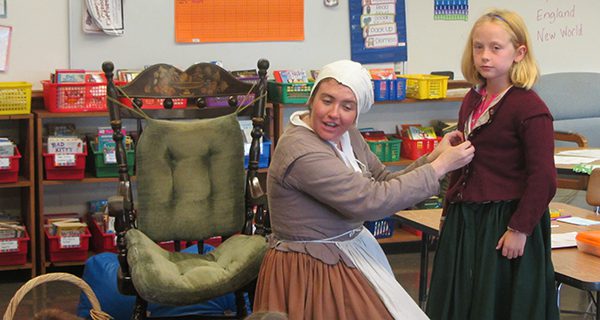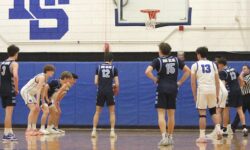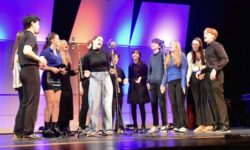[ccfic caption-text format="plaintext"]
By Stephen Press
Hometown Weekly Staff
The third graders of Ms. Lynn's classroom gathered on the mat, their eyes fixed on their visitor.
She asked: "Do you know the name of the king at present? Does anyone want to guess?"
A child's hand shot up. "King George III?"
"Hmmm, we've not had a George yet," she responded, "but that's a good English name. It could be a name for a king. Just not right now."
"One with a beard?" another child responded.
"I think so. Facial hair is very fashionable on kings, so I think he has a beard."
"King Tut?" hazarded a brave youngster as his classmates squealed.
"That's not an English name," responded the visitor. "I'm not familiar with that king. Is that your king?"
It was no surprise the kids were having trouble with their lesson. Their visitor, Constance Hopkins, after all, was straight out of 1624. Hopkins, a costumed Pilgrim interpreter from Plimoth Plantation, had come to talk with the kids for an hour about her roots in England, her voyage across the Atlantic, and her home in Plimoth.
For the third graders, who had been studying the Pilgrims all year, it gave new meaning to the term "living history."
The best was still yet to come, of course - Hopkins' visit was just another step on the Wheelock School's third grader's path to Plimoth Plantation and Rocky Woods.
"We do a lot of research and work on the Pilgrims before we go, so the kids have a lot of background knowledge. We have the Pilgrim come to get them excited. It gets them thinking about what life was like in the 1620s," explained Rachel Lynn, whose students were mesmerized by their visitor from the past.
"We get to interact with the actors at the Pilgrim Village. They get to touch things and walk around. As our curriculum goes on, we learn the entire story of the Pilgrims, from the time they left England to the time they came here and built houses … We then reenact the first feast at Rocky Woods," she continued.
Ms. Lynn herself was fortunate to experience an earlier iteration of Wheelock's Pilgrim program as a child as well. Still, it doesn't compare to what it has become in the present day.
"It's totally evolved since I was in school," Lynn affirmed. "In 1978, I was in third grade. When we went, half of us were Native Americans, half of us were Pilgrims. Now we're all Pilgrims, so it's changed a little bit. We had a corn muffin, wove a placemat, and that was it. I think we had applesauce. Now it's totally changed."
"It's really a huge part of the Massachusetts framework social studies curriculum for this age group," said Principal Donna Olson. "We are very fortunate to have a very supportive PTO that funds all of our programming of this nature. It also will prepare the boys and girls for their big field trip, which is to Plymouth."
Olson, through both observation and empirical evidence, understands the impact of the Pilgrim program. "When asked what were some of the highlights of their Medfield school career," she explained "kids in the high school actually mentioned Rocky Woods in third grade, which is really lovely.
"It's a real tradition, but it's still really current and connected to the curriculum.
"It's so interactive," said Olson, reflecting on the program's staying power. "It's not just reading about the Pilgrims in a book. It's participating in and learning Pilgrim games. Learning archery. The fishing - they fish at the pond at Rocky Woods. They cook in school - they bake some cornbread and different items that the pilgrims make. It's so interactive and hands-on. It's such an amazing experience for them that it really sticks."
As for how the kids fared in their lesson up in Ms. Lynn's room?
"They seem very respectful and very curious as to my story," said Constance Hopkins as she bade the children, still processing their last hour in class, farewell. "I hope that they learned something that will serve them well when they come to visit in a few weeks."










